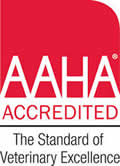WELLNESS CARE
(TO LIVE BETTER, HAPPIER, HEALTHIER, AND LONGER)
 Your Special Friend
Your Special Friend
We hope that you recognize and believe your dog and/or cat is a special companion and an important member of your family. He/she depends on you for nearly everything. And, he/she deserves a high level of care, according to your ability.
 Dogs & Cats Cannot Talk
Dogs & Cats Cannot Talk
- Most of us forget about this, but please remember that your dog and cat cannot talk. Think about that for a moment - really think about it. Dare to play some mental role reversal here - you be your dog or cat. He/she be you. Just because your dog or cat 'appears' normal (to you - someone who does not speak dog or cat language), this does not in any way make it so. The lack of crying, lameness, lethargy, or diminished appetite does not necessarily mean a well cat or dog.
- You must observe your pet carefully. Remember that perception and reality often are not the same. And try not to assume.
 Preventive Care
Preventive Care
- We believe passionately in preventive care. It makes so very much sense. In human medicine, in study after study, preventive care has been shown to be very much effective. No question. Slam dunk. Well, we are learning the very same thing seems to be so with dogs and carts. Big surprise!
- This is a big issue. Prevent. Prevention. Prevent. Learn to understand and believe that preventive health care (just like preventive human health care) is best for both your dog and cat and for you (and less expensive and less problematic in the long run).
- Learn to anticipate and prevent problems. Embrace warmly the concept of preventive feline & canine health care
- But - preventive care requires effort & attention on your par. It just cannot be done without you!
- most effective
- least expensive in long run
- fewer health problems
- many issues prevented and/or diminished
- higher quality of life
- less discomfort & pain
- happier & more content pet
- longer life
now - ain’t all the above a good deal?
 Water
Water
- fresh & changed as needed
- virtually always available
- bowl washed at least once a day
- did you know that many cats love those waterfall water fountains - try one
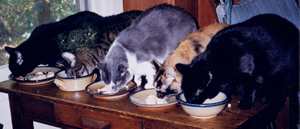
 Food
Food
- feed a name brand food; we think they’re better (research and quality control) than generics
- feed 100% dry food – our recommendation (not all agree - dental disease)
- feed one brand (& flavor) of food; don’t switch brands. Dogs & cats thrive on 'nutritional monotony' - yes a whole life of the same food. It works and most dogs & cats like it.
 Feeding
Feeding
- feed a measured amount and feed same measured amount each day
- feed adult dogs only once daily
- adult cats feed a divided amount twice daily; free choice feeding can lead to being overweight
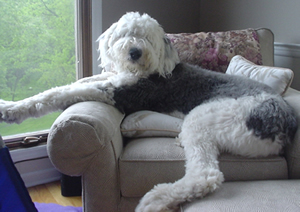
 Housing
Housing
- provide appropriate and adequate housing
- the majority of dogs and cats (perhaps not all) probably prefer to live inside and be with you
 Cat Litter Box (LB)
Cat Litter Box (LB)
- this is maybe the biggest of the biggies of preventive care issues for overall cat wellness – but most pressing concern is cat urologic health (bladder infections & kidney disease)
- place LB in proper location(s) – i.e. near to where cat is
- use good litter (not all the same)
- scoop box (clumpable litter) or change box (clay litter) at least twice daily
- cats really want & they do need & they really must have a clean LB (all the time)
- see section on Litter Box Maintenance
 The Overweight Condition
The Overweight Condition
- huge issue ('huge' issue - get it?)
- A recent study in dogs showed that 50% of dogs in America are overweight or obese. A national study has not yet been done for cats, but many cats are now overweight also.
- the overweight condition in dogs - mainly musculoskeletal disorders (problems of the knee, hip, and lumbar spine) and breathing problems (especially in short nosed breeds).
- the overweight condition in cats – diabetes, liver disease, musculoskeletal disorders, lethargy, & decreased activity.
- appropriate weight is not so hard to maintain; see sections on Food & Feeding above
- overweight dogs & cats need low-calorie food.
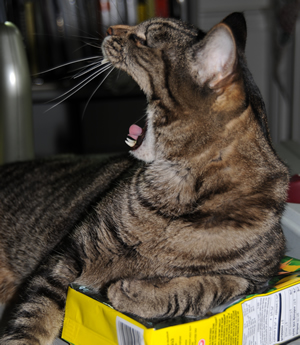
 The Annual Visit to Veterinarian
The Annual Visit to Veterinarian
- so important
- at least once every 12 months and not less often (remember that one dog or cat year = 4-7 people years)
- complete and thorough patient history, physical examination, and case review
- Consultation is an encompassing, plentiful, and meaningful dialogue between veterinarian and owner on any and all aspects of canine & feline care. No subject should be off limits. Remember that you are your dog's communicator.
- vaccines, heartworm test, and fecal exam as needed
 Vaccinations
Vaccinations
- safe, effective, inexpensive, and important
- In Dr. Wayne’s almost 4 decades of practice, he used to see and treat many of the diseases that we now vaccinate against and no longer see. That is, he used to see dogs & cats become ill & die (some survived) from many of the diseases which are now virtually 100% preventable – because of vaccines.
 Heartworm Disease Prevention
Heartworm Disease Prevention
- This disease, passed by mosquitoes, occurs worldwide and is virtually 100% preventable.
- testing & medication to prevent
- many folks do this 12 months per year so that they do not forget & hence start too late and/or finish too soon
- other folks give this in the warm weather
- test yearly at Annual Visit (inexpensive, easy, & effective)
 Pet Insurance
Pet Insurance
- it is becoming increasingly more popular in the U.S.
- an important consideration
- we highly recommend pet insurance
- our recommendation is Trupanion pet insurance
- see section on Pet Insurance

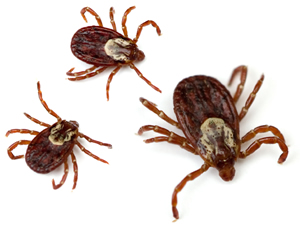 Tick Disease
Tick Disease
- issue of real concern
- we used to say & speak of Lyme disease. No more. Now it’s tick disease – currently 5 diseases
- Hunterdon County has more than its share of tick disease
- vaccinate yearly against Lyme Disease
- use a veterinary recommended tick control product 12 months per year
- need both Lyme vaccination & tick control product for maximal protection
- we now also test yearly for tick disease at the Annual Visit
- ticks – no redeeming values – avoid & prevent
- see section on Tick Disease
 Fecal Examination
Fecal Examination
- easy & inexpensive
- at least once yearly to rule out internal parasites
 Dental Care
Dental Care
- issue of considerable concern – see section on Dental Disease
- 80% of all dogs & 70% of all cats by 2 years of age are affected with dental (periodontal) disease
- dogs & cats with high quality dental care (home & veterinary) and 'clean mouths' have fewer health problems, a higher quality of life, and they can live linger (less kidney disease)
- veterinary visits & cleanings as needed
- feed dry food (our view – not all agree)
- daily teeth cleaning – only 20 seconds/day - use our gauze or infant facecloth
or small brush or whatever -but use something!

Chew Products For Dogs
- provide daily & 24/7
- these are ‘tools’- i.e. no calories & not to be confused with dog treats
- 2 purposes: great for dental health & keep dog happy when owner not around or otherwise engaged
- examples - rawhides, cow hoofs (without fattening ‘goo’ inside), Nylabones, bully sticks, artificial bones, budda ropes, congs (without fattening’goo’ inside ), and others
 Coat Care
Coat Care
- dogs & cats need brushing – according to the nature of the coat
- grooming as needed
- cats need coat care also
 Use Your Telephone
Use Your Telephone
- call us if you have a question or problem
- the only silly question is the one you did not ask
- remember - you are your pet’s communicator

 Office Appointment
Office Appointment
- If you suspect a problem with your dog or cat, schedule an office consultation to see us
- If you need to discuss, review, or explore a problem or concern with your cat or dog, schedule an office consultation to see us
- easy, usually effective, information packed, usually of good value, and often fun.
 Senior Care & Issues
Senior Care & Issues
- this is a whole area
- with better care, our cats & dogs are living longer
- this increased longevity is a good thing - but along with it comes a new layer of needs, issues, responsibilities, and costs.
- again – very important reason to limit your number of dogs & cats
- foods – may change
- exercise – will change
- house soiling issues may arise
- veterinary visits, care, & diagnostics may increase
- medications – arthritis, heart, kidney disease
- thoughts to ponder
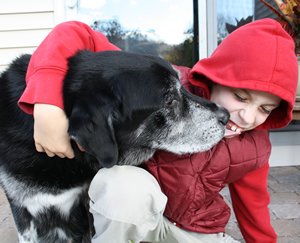
 Exercise
Exercise
- dogs need exercise – and they need it on a regular & repeated basis
- dog exercise varies according to breed, age, & issues
- sensible walks are almost always good (12 months a year)
- not all dogs should walk or run long distances
- cats very much need exercise also (really) – on a regular, repeated, daily basis
- cat exercise – number of ways to do this
 Flea & Tick Prevention
Flea & Tick Prevention
- important, effective, and safe
- You can now choose to have no fleas on your dog or cat, now or in the future. But with ticks you can only very much decrease their number.
- fleas are much less of a concern these days (but a concern nevertheless)
- ticks are much more of a concern these days
- veterinary prescription products may be superior - more reliable, safer, and more effective
- tick products are 12 months per year
 Consider To Limit Your Pet Number To One or Two Or Maybe Three
Consider To Limit Your Pet Number To One or Two Or Maybe Three
 Controversial – but someone needs to say it. We ought to consider having no more than one, or perhaps two, or maybe even three dogs and/or cats. You may be the exception, but this probably applies to most of us.
Controversial – but someone needs to say it. We ought to consider having no more than one, or perhaps two, or maybe even three dogs and/or cats. You may be the exception, but this probably applies to most of us. - most of us do not have the time, effort, nor financial resources to care well for more than this number
- The finances for food, housing, toys, products, boarding & kenneling, veterinary services (preventive, diagnostic, dental, and illness), flea/tick products, and heartworm preventive medication are very real. For most of us these discretionary finances are finite, and they do not allow us to care well for more than one or two dogs or cats.
- Please think long and hard before you choose to exceed the number one or two. At least think about it.
 Love, Time, Care, & Affection
Love, Time, Care, & Affection
- Oral indications of how much we love our pet are nice to hear. But they are just words. We cannot spend this currency at the supermarket.
- Please, please, please - spend time with your dog and cat multiple times each day and every day. We are their whole, entire world. Think about it.
- Talk to your dog and cat. Hug, pet, kiss, tousle, play with, and love your pet. Spend time together. Have fun together. It is good for the both of you
DR. WAYNE’S PET LIFE CONTRACT
You are your pet’s facilitator
Your pet depends on you for absolutely everything (think about it)
You entered a ‘contract’ when you obtained your pet – make certain that you keep up your end of the bargain (no shoulda, woulda, couldas)
Spend time together daily– talk to/with, cuddle, pet, & play with
Provide exercise on routine basis (not just when convenient)
Pain & suffering are unacceptable
Pain (especially aging & chronic arthritis) is treatable – make sure you treat it! old, arthritic dog - none of this - ‘I don’t think he hurts’
You are your pet’s entire world – think about it
Pets cannot talk – to ask for something or tell you of a problem (remember this)
Keep no more pets than you can well care for (for most homes that’s 1, 2 , or maybe 3)
Again, you are your pet’s facilitator - he/she depends on you for absolutely everything
Love is action – it’s so much more than an easily spoken word

